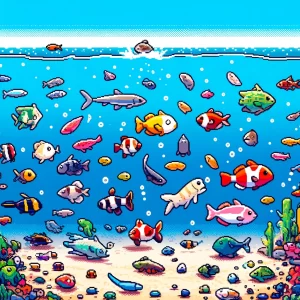
Why We Care About Some Fish More Than Others
Ever wonder why some fish get all the attention while others remain under the radar? Maybe not? Or maybe it’s something you only think about when a story about fish fraud shows up.
A recent study explored this question by analyzing human interest in 2408 species of reef fish. The findings revealed intriguing insights into our biases and how they affect conservation efforts. Let’s explore the findings and see what they mean for the future of our oceans.
The Study in a Nutshell
Researchers used online databases and social media to gauge human interest in reef fish. They measured this interest in two ways: research effort (scientific studies and data) and public attention (social media and general public interest). Surprisingly, they found that a fish’s geographic range size heavily influences both of these dimensions. In other words, the more widespread a species, the more attention it gets. But there’s more to the story.
Why Some Fish Get More Attention
Research Effort: The Science Behind It
Scientists tend to focus their research on fish that are commercially important, such as those heavily fished or used in aquaculture. These fish often have a large geographic range, making them more accessible for study. For example, the Orange-spotted grouper is a fishery favorite and, thus, a research hotspot.
Public Attention: Beauty and the Aquarium Trade
On the other hand, the general public is more drawn to aesthetically pleasing fish, which often find their way into home aquariums. The Mandarinfish, with its stunning colors, is a prime example. Public attention also spikes for fish that are frequently featured on social media platforms like Flickr and Twitter.
The Hidden Biases
Interestingly, the study found that certain families of fish receive disproportionate amounts of attention. For example, families like Pomacanthidae (angelfish) and Chaetodontidae (butterflyfish) are beloved for their beauty, while others, like cryptobenthic fishes (tiny, bottom-dwelling species), are largely ignored. This bias extends to conservation efforts, where species at the highest risk of extinction often receive less attention and research.
The Consequences of Our Biases
Conservation Implications
The lack of attention to less charismatic fish can have serious consequences. These overlooked species play crucial roles in their ecosystems, and neglecting them can disrupt the balance of marine environments. For instance, cryptobenthic fishes, despite their low profile, are vital for reef health and resilience.

Climate Change Vulnerability
The study also highlighted that fish most vulnerable to climate change tend to receive less research effort and public attention. This is alarming because these species are at greater risk as ocean temperatures rise and habitats change.
What Can We Do About It?
Balancing the Scales
To address these biases, we need to shift our focus towards the less glamorous but equally important species. Scientists can prioritize research on these under-studied fish, and public awareness campaigns can spotlight their ecological value.
Leveraging Technology
The rise of digital platforms offers a unique opportunity to balance human interest. By harnessing the power of social media and online databases, we can spread awareness about the importance of all reef fish, not just the popular ones.
Encouraging Engagement
Now, let’s get you involved. Consider these questions:
- What is your favorite reef fish, and why do you think it gets more or less attention than others?
- How can we use social media to raise awareness about the importance of lesser-known species?
Your thoughts can help shape future conservation efforts. Share your answers in the comments below!
Conclusion
This study sheds light on the biases that shape our interest in reef fish and underscores the need for a more balanced approach to conservation. By recognizing and addressing these biases, we can ensure that all species receive the attention they deserve, ultimately preserving the intricate balance of our marine ecosystems.
Power your scientific knowledge!
Discover revolutionary research and innovative discoveries with ‘This Week in Science’! Designed for educators and science lovers, our free weekly newsletter offers insights that can transform your approach to science. Sign up now and deepen your understanding and passion for science.



